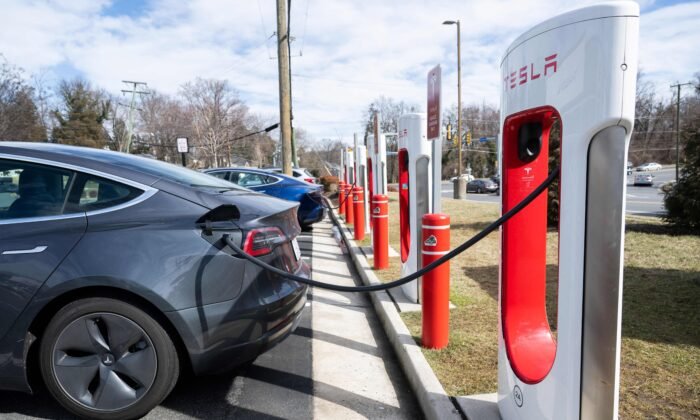Government Analysis: Phasing Out Gas-Powered Vehicles by 2035 to Cost Consumers $17.4 Billion
A plan to make all new vehicles sold in Canada zero-emission electric by 2035 would cost consumers $17.4 billion from 2024 to 2050, government documents show.
The Regulatory Impact Analysis Statement, released Dec. 21, revealed that consumers can expect the switch to zero-emission electric vehicles (ZEVs) to cost $54.1 billion with a return of $36.7 billion in savings. That would equal a net cost of $17.4 billion.
“The Amendments are estimated to have incremental ZEV and home charger costs of $54.1 billion from 2024 to 2050 for consumers who switch to ZEVs in response to the Amendments,” reads the statement. “These same consumers are expected to realize $36.7 billion in net energy savings over the same time period.”
Environment Minister Steven Guilbeault announced Dec. 19 that Canadian vehicle manufacturers would need at least one-fifth of the vehicles they sell in 2026 to be fully electric or plug-in hybrids. That number will rise to three-fifths by 2030 and then to 100 percent by 2035.
Automakers will be issued credits by the Canadian Environmental Protection Act for the EVs they sell. Manufacturers that sell more EVs than needed to meet each year’s target will be able to bank those credits to meet targets in future years or sell them to companies that did not sell enough. Auto manufacturers can also cover up to 10 percent of the credits they need each year by investing in public fast-charging stations.
According to the document, there is an “urgent need to address climate change” by moving to a low-carbon economy, and passenger cars and light trucks account for approximately 40 percent of Canada’s transportation sector emissions. “Reducing emissions in all sectors, including transportation, is necessary to tackle climate change and reach the Government of Canada’s emission reduction target of 40 percent to 45 percent below 2005 levels by 2030 and net zero by 2050,” the document states.
Costs and Savings
The document claims that of the $54.1 billion in estimated costs, $38.5 billion would come from the costs of ZEV chargers, $15.5 billion would come from the costs of the vehicles themselves, and $2.6 billion would come from administrative costs.
“It is expected that these incremental costs will be passed onto ZEV purchasers. These consumers are also expected to incur ongoing costs associated with charging their ZEVs instead of paying liquid fuel costs for non-ZEVs,” the document states. The federal government would not incur any additional costs “beyond the need to inform stakeholders of the amendments.”
The document states that energy savings will come from ZEVs being more fuel-efficient than traditional gas and diesel-powered vehicles, citing the U.S. Department of Energy’s estimate that non-ZEVs use only 12 to 30 percent of their energy from fuel to operate, while ZEVs are 60 to 73 percent efficient. It also claims that regenerative braking—which captures kinetic energy that would have otherwise been wasted when a vehicle decelerates—could make ZEVs 77 to 100 percent efficient.
While electricity would amount to $63.3 billion in costs, fuel cost savings would total $99.9 billion, resulting in savings of $36.7 billion, according to the document. The analysis states that the net energy savings will rise over time as more ZEVs are put into operation, while annual costs of purchasing ZEVs and chargers will increase from 2026 to 2035 and then “fall in subsequent years as the number of baseline ZEVs increase annually.”
Social Cost of Carbon
The document states that the reduction in greenhouse gas emissions (GHG) from the switch to ZEVs would provide $96.1 billion in value from “avoided global damages,” which would offset consumer losses. The cumulative 362 megatonnes of GHG emission reductions would help Canada meet its climate commitments for 2030 and 2050, which would result in total benefits of $132.8 billion and net benefits of $78.6 billion, according to the document.
In order to calculate the benefits, the quantity of GHG emissions avoided each year was multiplied by the Department of the Environment’s schedule of the value of the “social cost of carbon” (SCC). The SCC, released in April 2023, measures the impact carbon, methane, and nitrous oxide have on things like food production, human health, energy systems, disaster repair bills, and property values.
While a previous analysis estimated that by 2020 the SCC would be $53 a tonne, Ottawa’s latest model estimates that the SCC is closer to $247, set to rise to $294 by 2030.
Mr. Guilbeault said in September that Canadians were paying a “very high price tag for the impacts of climate change,” and that the federal government’s carbon tax was “one of the best ways to fight” it. The carbon tax currently adds more than 14 cents to a litre of gasoline and, despite Ottawa giving out rebates to Canadians, the Parliamentary Budget Officer has said most families will see a “net loss” from the carbon tax.
The document says that while medium-sized battery EVs will become less expensive than regular vehicles by 2033, three other EV types will not. According to the report, medium-sized plug-in hybrid EVs, battery-electric light trucks, and plug-in hybrid EV light trucks will be more expensive than their non-electric equivalents by 2035.
It also warns that Canadians living in rural and northern regions could expect to face “more difficulties with the transition to zero-emission vehicles” because of colder temperatures, that the heavier weight of ZEVs could mean accidents result in fatalities more often, and that drivers could expect to pay higher insurance premiums.




